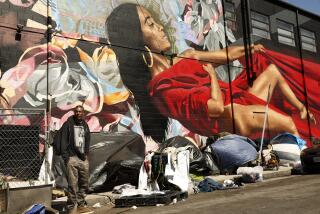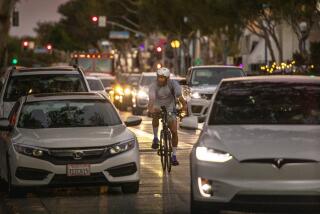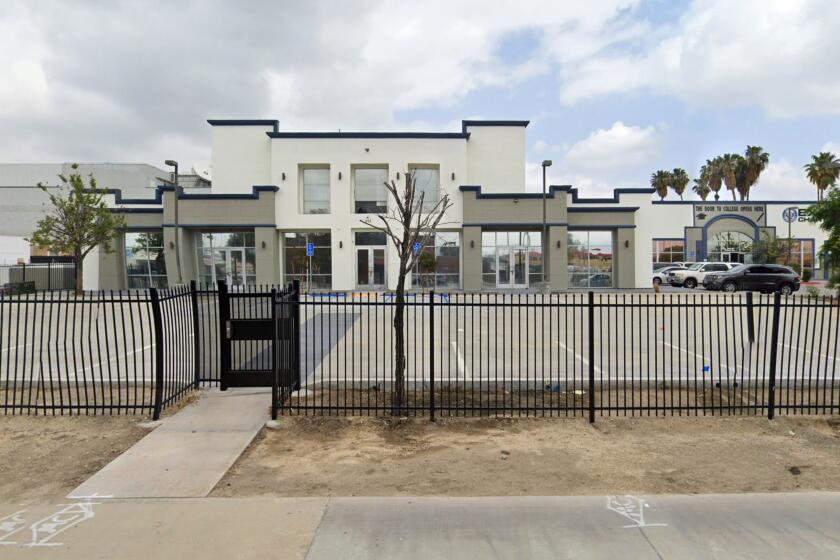Minority of L.A. County voters quashed transit tax extension
A minority of voters living in a daisy chain of small, suburban and relatively upscale enclaves around the county’s outer rim were largely responsible for last fall’s razor thin defeat of a $90-billion transit tax that received lopsided ballot box support, a Times analysis shows.
The review comes as several of Los Angeles’ senior politicians have joined state lawmakers to push for a reduction of the threshold for passage of such measures, arguing that the current two-thirds requirement is undemocratic and hinders the region’s growth.
The transit tax extension, known as Measure J, was approved by 66.1% of some 3 million voters but fell 0.6%, or just 16,000 votes, shy of the required two-thirds supermajority.
Regions such as the South Bay, with higher concentrations of staunchly anti-tax voters, played a decisive role in defeating the proposal.
Elsewhere more than two-thirds of voters did approve the measure, which would have extended a half-cent sales tax for at least three decades, allowing borrowing that could have accelerated expansion of the county’s rail network.
Los Angeles Mayor Antonio Villaraigosa, county Supervisor Zev Yaroslavsky and other elected officials have bemoaned the ability of a slim margin of voters to block the will of the majority.
“Only in California can 66% be considered a loss,” said Yaroslavsky, who supported Measure J. “It’s an absurd threshold that’s been imposed on us.”
Villaraigosa has said that after he leaves office in June, he will continue his campaign to complete 30 years’ worth of transit projects in a decade. Villaraigosa has tried various as-yet unsuccessful strategies to fund his so-called “30/10” program — including Measure J, partnering with the Chinese government and advocating fiercely in Washington.
The mayor recently told The Times he was working with state legislators on a proposal to reduce the approval threshold for transportation projects to 55% — an idea that has faced stiff resistance in the past. He said he would continue to pursue the local sales tax extension.
“I intend to bring it back on the ballot whether or not I’m mayor,” Villaraigosa said. “It’s critical.”
MoveLA, a pro-transit group that supported the tax extension, also is promoting a lower approval threshold.
Since Measure J’s defeat, eight bills have been introduced in the state Legislature to reduce the passage threshold, said Denny Zane, executive director of the group.
Some apply to parcel taxes for schools and community colleges, and others would affect special taxes to fund libraries, according to a MoveLA analysis. “But five of the eight would reduce the threshold for ‘special taxes’ for transportation projects,” the group’s website notes.
But at least one influential group that fought Measure J — the county’s Bus Riders Union — also opposes lowering the approval threshold for transit taxes.
Both candidates vying to replace Villaraigosa — City Councilman Eric Garcetti and City Controller Wendy Greuel — supported Measure J and say they also plan to continue pursuing Villaraigosa’s stepped-up transit construction strategy if elected in May.
The incoming mayor will face a powerful minority of political leaders who have been critical of recent transit tax measures, including Republican Supervisors Don Knabe and Michael D. Antonovich, who sit on the Metropolitan Transportation Authority board.
Antonovich opposed Measure J and its 2008 predecessor, Measure R, which increased county sales taxes by half a cent. During one tirade on the issue, Antonovich infamously compared Villaraigosa’s campaign tactics on Measure R to “gang rape.”
The Times analysis suggests that similar tax increases could face narrow swaths of steadfast voters that can hold considerable clout. Chuck Anderson, a Manhattan Beach accountant, said he has voted in every election for more than four decades.
“I vote no on every single thing dealing with taxes. I don’t care what it is,” said the 68-year-old registered Republican. “I work my tail off.”
Kris Vosburgh, Los Angeles-based executive director of the statewide Howard Jarvis Taxpayers Assn., said the two-thirds requirement is necessary so voters like Anderson are protected from politicians determined to fund pet projects.
“These people who want more of the public’s money are always saying this. The whole idea behind the two-thirds vote is to give a little added protection to those who are going to have to pay the tax,” Vosburgh said.
The Times analysis found that coastal city support for the proposed sales tax extension had eroded significantly from four years earlier when county voters approved Measure R by a two-thirds majority. That sales tax increase is helping to fund projects such as a Westside subway and a key rail connection under downtown L.A.
Measure R expires in 2039. The failed November proposal, Measure J, would have extended the added tax until at least 2069, allowing officials to borrow billions of dollars to speed up rail construction.
In Manhattan Beach, Redondo Beach, Torrance and Rolling Hills, the analysis found, support for Measure J dropped between 6 percentage points and 10 percentage points compared with Measure R. Several other areas on the edges of L.A. County showed drops of more than 10% in support for Measure J, including Malibu and Agua Dulce.
Overall, support for Measure J dropped by more than 6 percentage points compared with Measure R support in 34 L.A. County communities.
The lingering effects of the recession and low voter turnout were probable factors, some observers believe, but there were other issues at work. In Beverly Hills, support fell 16%. Metro critics there have been fighting a proposed subway alignment that calls for tunneling underneath the city high school. Construction would probably have accelerated if Measure J had passed.
A number of communities pivotal to the November vote, some represented by Knabe and Antonovich, have voter profiles that are more fiscally conservative than the county as a whole. For example, in the South Bay, 39% of registered voters in Manhattan Beach are Republican — nearly twice the countywide average. Thirty-six percent of Torrance voters are registered as Republican, as are about one-third in Redondo Beach.
“What was Measure J?” asked 46-year-old Redondo Beach investor Jay Markham, drying off next to his silver Audi after an afternoon surf. “Anything with a tax, I don’t think I voted on it.
“I was pretty much thinking there’s probably too much waste, or there’s not enough oversight to see where that money actually goes,” he said.
Several South Bay voters expressed similar sentiments, but one, attorney William Joseph Thesing, said he voted for the transit tax extension.
Parking along a popular stretch of restaurants and boutiques, the 50-year-old Lomita resident hopped out to grab lunch at an upscale Manhattan Beach cafe.
“I actually am in favor of things like that,” he said, “that collectively help the community.”
Times staff writer Rich Simon in Washington, D.C., contributed to this report.
More to Read
Start your day right
Sign up for Essential California for news, features and recommendations from the L.A. Times and beyond in your inbox six days a week.
You may occasionally receive promotional content from the Los Angeles Times.







